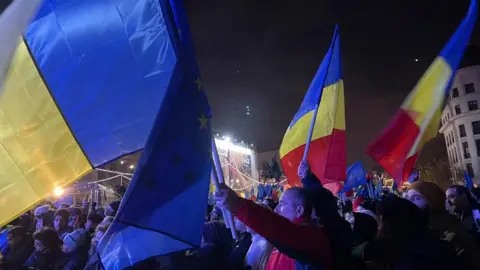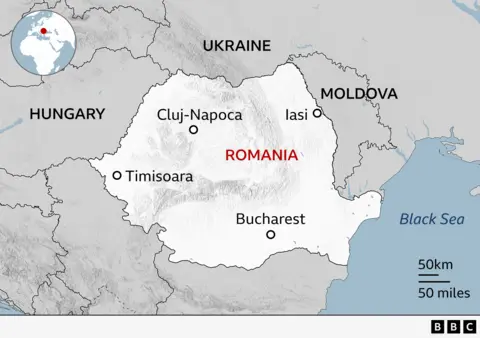Romania's cancelled presidential election and why it matters
 Sarah Rainsford/BBC
Sarah Rainsford/BBCForty-eight hours before Romanians were due to vote in a presidential election run-off, the whole process was scrapped because of an unprecedented ruling by the constitutional court.
The court's decision to annul the first round came after a far-right independent candidate, Calin Georgescu, came out of almost nowhere to lead the first round two weeks ago amid allegations of Russian interference.
Georgescu has condemned the ruling as a coup and Romania may have to wait months to vote again.
Why this decision matters
Romania is a key Nato member on its eastern flank and shares a long border with Ukraine.
It is not the first Eastern European state to fend off Russia's hybrid war, and the constitutional court has ruled that intelligence revelations of Russian meddling are sufficiently serious to put the presidential vote on hold.
Moldova's recent presidential vote was held amid alleged Russian interference and voter fraud, and across the Black Sea in Georgia, the pro-Western opposition says contested elections there were hit by Kremlin meddling.
Why has the vote been annulled?
Opinion polls were almost neck and neck going into Sunday's race. Almost 19 million Romanians were eligible to choose between Calin Georgescu and liberal mayor and former TV journalist Elena Lasconi.
Latest polls even gave Lasconi the edge in the run-off.
But then on Wednesday Romania's outgoing President Klaus Iohannis declassified intelligence documents from the supreme council for national defence suggesting that almost 800 Tiktok accounts created by a "foreign state" in 2016 were suddenly activated last month to full capacity, backing Georgescu.
Another 25,000 TikTok accounts had become active only two weeks before the first round.
Romanian foreign intelligence said Russia was the "enemy state" involved and had engaged in hybrid attacks including tens of thousands of cyber attacks and other sabotage.
Domestic intelligence put Georgescu's sudden surge in popularity down to a "highly organised" and "guerilla" social media campaign" that involved identical messaging and social media influencers.
TikToks promoting him were not marked as election content, violating Romania's laws, it said, while one account paid out $381,000 (£300,000) in the space of a month to users who pushed Georgescu's candidacy, while he said he had not paid anything for his campaign.
That decision to declassify intelligence documents changed everything.
Judges from the constitutional court met on Friday to consider a large number of requests to annul the first round.
It was a complete about-turn from a decision four days before that approved the initial 24 November vote after a complete recount of 9.4 million votes.
What does the ruling say?
In its single-page judgement, the constitutional court says that in order to ensure the fairness and legality of the electoral process it has unanimously decided to annul the entire vote and the government must establish a new date for a re-run.
The court says cites its role under the constitution "to guard the observance of the procedure" of presidential elections.
It stresses the decision is final and binding.
The president in Romania wields considerable power as commander-in-chief of the armed forces and with the task of appointing the prime minister.
Who is Calin Georgescu?
Calin Georgescu, who calls himself a university teacher, was a relative unknown in the presidential race.
He denies he is a fan of Vladimir Putin, although he sees the Russian leader as a "patriot and a leader" and wants to put an end to political and military aid to Ukraine.
"Zero. Everything stops," he told the BBC's Sarah Rainsford. "I have to take care just about my people. We have a lot of problems ourselves," in words that reflect his Romania-first stance.
He says while Romania should remain in international organisations such as the EU and Nato, it must end its "subservient" role.
He also condemns allegations that Russia was behind his electoral success as intelligence "lies".
A 62-year-old agricultural engineer by profession, he held high-ranking civil service jobs years ago at Romania's environment and foreign ministries.
He is also a conspiracy theorist who believes Man never landed on the Moon and the Covid-19 pandemic never happened, despite the seven million deaths worldwide, reported by the World Health Organization.
What do Romanians think?
Romanians are split over the constitutional court decision.
"Today the Romanian state trampled democracy underfoot," liberal candidate Elena Lasconi complained.
Crin Antonescu, former leader of the National Liberal party however welcomed the court ruling and said he could not understand Lasconi's reaction. "This is exactly right, to start [the whole race] again from scratch," he told Romanian media.
There has been anger from supporters of Calin Georgescu.
"We are witnessing a lying political class scared of losing power and capable of any injustice to keep their power and positions," Eugen, an entrepreneur in the western city of Timisoara told the BBC.
Romanians who have been unenthusiastic about both candidates are unsure whether to be glad they do not have to decide on Sunday, or concerned for the future of Romanian democracy.

What happens now?
The election starts all over again in three or four months' time, to give candidates a chance to gather endorsements to run.
In the meantime, incumbent President Klaus Iohannis has said he will remain in post until the next president is elected.
There is no reason why Georgescu cannot run again, although he may face criminal proceedings as a result of the allegations made against him which he denies.
Romania has only just held parliamentary elections in which the centrist parties did better than expected. The Social Democrats are likely to lead the next coalition government.
However, three far-right parties between them polled 32% of the vote, and one of them, George Simion's AUR, came second.
Another factor of uncertainty is how Georgescu supporters will react to the annulment.
Will they take to the streets, or look to support Calin Georgescu or another nationalist candidate when Romania eventually returns to the ballot box?
